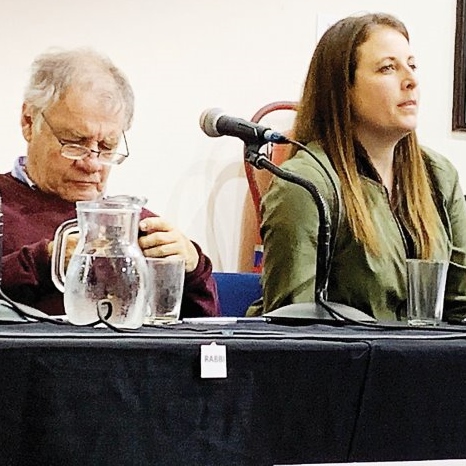
News

Dope decriminalised, but addiction up
MOIRA SCHNEIDER
“The core of addiction is the struggle to ask for help,” said Russon who was part of a panel discussion on the decriminalisation of marijuana at the Sephardi Shul hall in Sea Point on Sunday night held under the auspices of Jewish Community Services (JCS) in Cape Town.
Judge Dennis Davis of the Western Cape High Court; Dr Cecil Schneider, a psychiatrist in private practice; Rabbi Nissen Goldman, the co-director of Chabad on Campus at the University of Cape Town; and Professor Dan Stein, chair of the department of psychiatry and mental health at UCT were also on the panel.
The Constitutional Court (Concourt) decriminalised the possession and cultivation of cannabis for personal use in September last year. This confirmed a judgement of the Western Cape High Court. Effectively, it’s unlawful for police to arrest adults who use relatively small amounts of cannabis, pending Parliament enacting legislation to regulate the situation.
Davis, who presided over the Western Cape High Court case in March 2017, said the judges had to consider the question of whether criminal law was the appropriate means with which to deal with the abuse of consumption of cannabis by private individuals.
Other issues the court pondered, he said, were to what extent the government could dictate conduct that was considered harmful, and whether the existing criminal law restricting cannabis was an infringement of the right to privacy.
“We came to the view that the use of the criminal law to curb a social problem was disproportionate to the rights guaranteed in the Constitution. By decriminalising it, we’re effectively saying that criminal law is inappropriate to deal with the problem.
“It should be decriminalised, and Parliament should sort it out. Social policy should be dealt with by the democratically elected representatives of the country, not judges.”
Agreeing that criminal law was not the best way to deal with the problem, Stein said that one should look at the harm caused by substances such as tobacco, cocaine, and alcohol. Cannabis was certainly less harmful than alcohol and tobacco.
Stein said the “war on drugs just doesn’t work”. He cited the example of Prohibition in the United States between 1920 and 1933, when “people drank more than ever. It also cost them a fortune to put people in jail.”
He cautioned about commercialisation, however. “We need to be careful about the capture of dagga by the government. If someone with money bribes the government to get an exclusive licence to farm dagga, it would be a major threat.” This, he believes, would threaten the livelihoods of small-scale black farmers and their ability to support their families.
Schneider spoke of the two major components of dagga, cannabidiol (CBD) and tetrahydrocannabinol (THC), saying the former was safe for human consumption, but the latter affected the brain and respiratory system.
He questioned what constituted privacy in the cannabis judgement. “Any person can appoint a place that is private [according to the Concourt judgement]. It doesn’t have to be his home, and he can theoretically invite other users, thereby exposing them to the detrimental effects.”
In the South African context with its high crime rate and understaffed police force, it would be impossible to control, he said.
Another of Schneider’s concerns related to the growth of dagga. “How much can be grown, and how much can be used [in private]?” he asked.
The Concourt had not defined the concept of privacy, according to Davis, whereas the Western Cape High Court judgement had confined usage to the home. “The Concourt made the regulatory framework more difficult than it should be. We don’t have the resources to regulate the matter. None of us is going to be able to rely on the police.
“One thing’s for sure, if you put somebody in prison, it’s a guarantee that they’re going be a criminal for the rest of their lives. Parliament may mess it up, Cecil [Schneider] may be right” if the police are tasked with monitoring.
Davis pointed out that several studies had shown that decriminalisation had not resulted in increased crime.
While it might not have increased crime, Russon is seeing a rise in drug-induced psychosis from cannabis in patients between the ages of 18 and 23 years. Where there is a personal and family history of mental illness, cannabis has exacerbated this tendency.
Many in the Jewish community have been admitted for rehabilitation to Houghton House, she said. In fact, there has been an increase in young Jewish adults in the facility.
In middle age, she said, alcoholism was on the rise. She commented on the fact that certain religious groups encouraged the imbibing of alcohol.
Goldman conceded that “besides the fact that getting drunk is against halachah (Jewish law), rabbis are sometimes guilty, myself included, for giving out le chaims (toasts to life) for non-holy purposes.”
In contrast to marijuana, which causes one to withdraw, alcohol promotes sociability in line with the goal of the Chassidic verbrengen (gathering), the idea of which is to promote closeness, he said.
Rhita Russon, a JCS social worker who moderated the discussion said, “There’s a lot of denial in the Jewish community [around addiction]. It’s swept under the carpet. People come to us only when it’s at crisis stage.
“A lot more education needs to be done in the community. We need to have these conversations in our schools, and rabbis need to raise the issue from the pulpit.”




